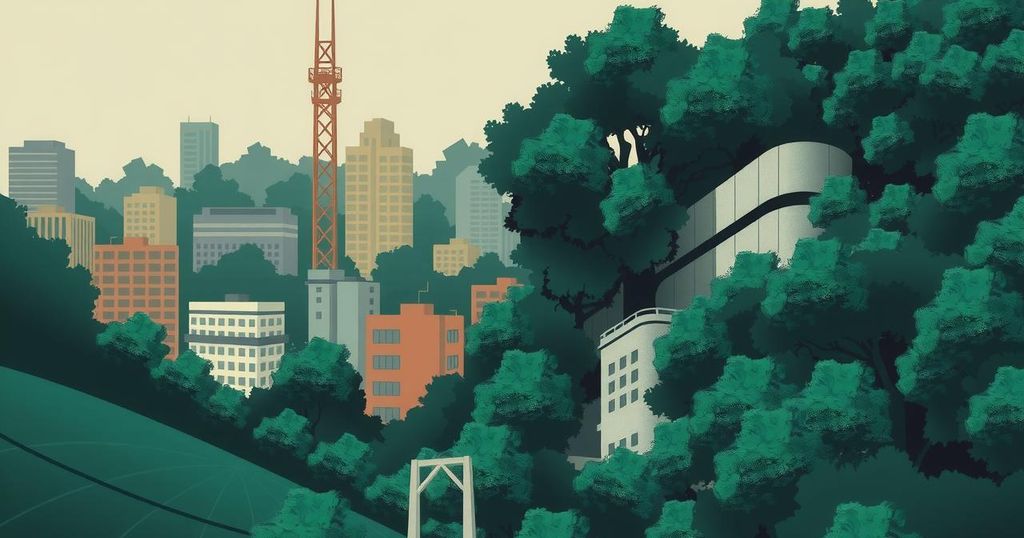Gunfire erupted in Goma as M23 rebels seized control, causing a humanitarian crisis with deceased bodies in the streets and overwhelmed hospitals. With communication lines cut, aid workers report children dying and severe shortages of resources. The M23, aiming for political power, faces a robust military response from the Congolese government, while local residents are fearful and displaced.
Gunfire echoed through Goma, the largest city in eastern Democratic Republic of Congo (DRC), as the M23 rebel group invaded, marking a serious escalation in the decade-long conflict. The situation has rapidly deteriorated, leading to the rebels’ swift takeover. Faith*, a 42-year-old aid worker, describes the dire humanitarian crisis, stating that bodies litter the streets and children are dying due to lack of medical care.
Communication has been severely hampered, as internet access has been disrupted to limit information dissemination. Faith remarked that those unable to flee are struggling without adequate resources. The M23, whose name refers to the March 23, 2009 peace accord following past conflicts, accuses the DRC government of failing to integrate Tutsis into the national army and administration.
The M23 rebels, allegedly supported by Rwanda, are capitalizing on the mineral wealth of the eastern borderlands. Faith reports that while some areas in Goma have quietened, fear persists and many residents remain indoors. Displaced individuals now find themselves scattered and homeless amidst the chaos.
As the M23 rebels aim for the capital Kinshasa, President Félix Tshisekedi has mobilized the military to counter this insurgency. Congolese Defense Minister Guy Kabombo Muadiamvita has dismissed the idea of negotiations, asserting the need for armed resistance. In a forthright video message, he emphatically declared, “We will stay here in Congo and fight. If we do not stay alive here, let us stay dead here.”
M23 leaders express a desire for dialogue but openly admit their aim is to gain political power, with political leader Corneille Nangaa proclaiming, “We want to go to Kinshasa, take power, and lead the country.” Meanwhile, the DRC faces a humanitarian crisis with over 2.7 million people displaced in North Kivu alone.
Bernard Balibuno, DRC representative for Cafod, recently fled Goma and reports that the situation is catastrophic, with widespread chaos lacking essential services. He describes people venturing out only in search of food and water due to fear of reprisal. Paradoxically, some Goma residents are apparently welcoming the rebel forces as a means of self-preservation, clapping to signal, ‘we are with you’ to avoid conflict.
Balibuno expresses profound concern for women and children, highlighting the risks of gender-based violence that become exacerbated in such crises. Faith concurs with this assessment, emphasizing that such violence has become commonplace. To the international community, Balibuno calls for support and urgent attention to the underlying political failures leading to this humanitarian disaster, stating, “Concerted diplomatic action is needed beyond just condemning the violence to get it to stop.”
The ongoing conflict in the DRC has been marked by numerous escalations over the past decade, particularly in the eastern regions such as North Kivu, where Goma is located. The M23 rebel group, which emerged from historical grievances between different ethnic groups and government actions, has sought to reclaim political power, asserting that the government neglects Tutsi rights. Increasing violence and instability in the region have exacerbated humanitarian crises, leading to widespread displacement and suffering among the civilian population.
The situation in Goma epitomizes a critical humanitarian crisis fueled by prolonged conflict and systemic political failures. As the M23 rebels gain ground, the dire needs of the population continue to grow, with dire predictions for the most vulnerable, especially women and children. Urgent international intervention and concerted diplomatic efforts are imperative to restore peace and address the humanitarian needs of those affected in the DRC.
Original Source: www.independent.co.uk






